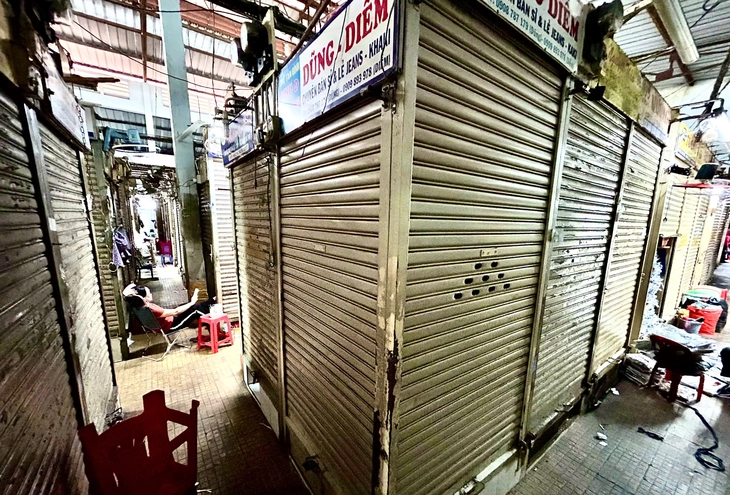
The tax authority confirmed that only 3.18% of closed businesses are required to implement electronic invoices connected to tax authority data. In the photo: closed stalls at Tan Binh market, Ho Chi Minh City - Photo: TTD
Meanwhile, according to the policy proposal of the tax management bill (replacement), which has just been sent to the Government for comments, the Ministry of Finance said that the tax sector will redefine the subjects of households and business individuals to manage according to scale, and at the same time establish quantitative criteria to determine appropriate management methods, consistent with tax laws.
Nearly 97% of households that have stopped doing business are not in the group required to use electronic invoices.
Recently, facing the phenomenon of many businesses in some localities, especially Ho Chi Minh City and Hanoi, suddenly closing down and ceasing operations, many opinions say that it is because traders are concerned about the implementation of electronic invoices (E-invoices) according to Decree 70.
However, according to the Tax Department, in addition to misunderstanding or incomplete understanding of tax policies and subjects applying electronic invoices, the reason why small traders closed their shops was due to fear of being inspected for trading in goods of unknown origin, fake goods, and poor quality goods.
Because according to regulations, only business households and individuals with annual revenue of 1 billion VND or more, operating in the fields of retail, restaurants, food and beverage, hotels, supermarkets, passenger transport, entertainment... are required to implement electronic invoices generated from cash registers.
According to the tax management database, the whole country has 37,576 business households that are required to implement electronic invoices from cash registers, accounting for only about 1% of the total of more than 3.6 million business households.
Meanwhile, many small businesses, even those not subject to regulation, have chosen to temporarily suspend operations due to concerns or misunderstandings that they all have to deploy cash register technology, which means changing processes, increasing investment costs and being subject to close supervision.
According to data from the Tax Department of Region 2 (HCMC), in May 2025, when the authorities stepped up preparations to implement Decree 70, 3,763 business households in HCMC stopped operating or closed.
However, only 440 of these households (accounting for 3.18%) have revenue of over 1 billion VND and are required to use electronic invoices from cash registers, corresponding to a tax of 1.4 billion VND. Most of the households that have stopped doing business are not in the group required to apply electronic invoices.
According to this agency, up to now, only 15,764 business households have implemented electronic invoices from cash registers, accounting for 6.7% of the total 232,798 business households in the area and only about 0.4% of the total number of business households nationwide.
"The regulation on electronic invoices only applies to households with revenue of 1 billion VND/year or more in some specific fields. However, confusion is widespread due to incomplete or incorrect information," said a tax official.
There will be a simple tax regime for small individual businesses.
An officer of the Tax Department of Region 2 affirmed that the implementation of electronic invoices does not change the tax policy currently applied to business households and individuals, but only changes the basis for determining revenue as a basis for tax authorities to determine tax rates close to the actual revenue generated by business households with revenue of 1 billion VND/year or more.
"This regulation does not affect the business activities of households and individuals with a revenue threshold of less than 1 billion VND/year," he affirmed. Meanwhile, in the policy proposal of the tax management bill (replacement) just sent to the Government , the Ministry of Finance said it will apply a flexible tax management method based on risk.
Specifically, businesses with stable locations and clear revenue will be subject to the management method of declaration combined with data from electronic invoices, from bank payment accounts, from digital platforms, and e-commerce platforms.
For small, mobile, low-risk businesses and individuals, the tax authority will support the creation of pre-filled declarations from the system application and send them to taxpayers for checking and confirming tax obligations. Notably, the Ministry of Finance said it will build a risk management mechanism instead of mass management, aiming at the goal of transparent records, simple tax payment, and random inspection.
At the same time, the Ministry of Finance will supplement a simplified tax regime for small business individuals. The aim is to simplify administrative procedures, reduce the frequency of tax declaration and payment for business individuals with low revenue and apply a mechanism of declaring and paying multiple types of taxes at once.
Along with applying a more flexible management mechanism, the tax authority also added regulations to bind responsibilities to business households. The tax authority also encouraged business households to convert to micro-enterprises or equivalent to small and medium-sized enterprises to ensure fairness and enjoy preferential policies.
According to the tax authority, it is expected that from January 1, 2027, households and individuals doing business with revenue of 800 million VND/year or more providing goods and services directly to consumers must apply invoices generated from cash registers connected to the tax authority, which is a reduction of 200 million VND compared to the current level.
From January 1, 2028, business households and individuals with revenue subject to value added tax of VND 800 million/year or more providing goods and services directly to consumers must apply invoices generated from cash registers connected to tax authorities.
Source: https://tuoitre.vn/nhieu-ho-kinh-doanh-dong-cua-do-lo-ngai-bi-kiem-tra-nguon-goc-hang-hoa-hang-gia-20250617080323133.htm


![[Photo] President Luong Cuong attends the 80th Anniversary of the Traditional Day of Vietnamese Lawyers](https://vphoto.vietnam.vn/thumb/1200x675/vietnam/resource/IMAGE/2025/10/09/1760026998213_ndo_br_1-jpg.webp)




![[Photo] General Secretary To Lam visits Kieng Sang Kindergarten and the classroom named after Uncle Ho](https://vphoto.vietnam.vn/thumb/1200x675/vietnam/resource/IMAGE/2025/10/09/1760023999336_vna-potal-tong-bi-thu-to-lam-tham-truong-mau-giao-kieng-sang-va-lop-hoc-mang-ten-bac-ho-8328675-277-jpg.webp)



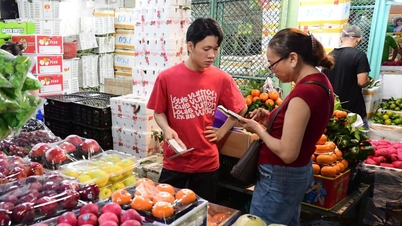


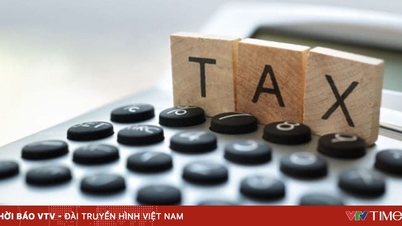










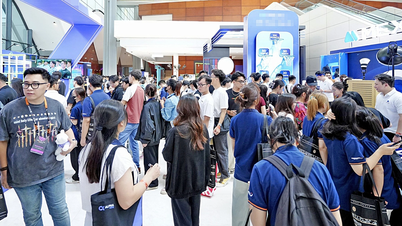




































![[VIDEO] AI version of BSR General Director Nguyen Viet Thang: From the mission of energy shield to the desire to contribute](https://vphoto.vietnam.vn/thumb/402x226/vietnam/resource/IMAGE/2025/10/10/1760062415027_0000371c-f2a1-31a0-38a9-e3de0ece2bbd.jpeg)

















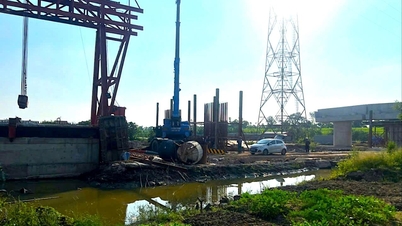






















Comment (0)